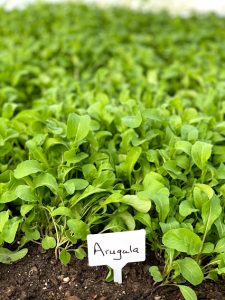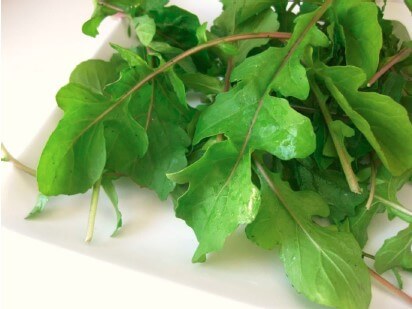Not Just Arugula Veggie!
Not Just Arugula Veggie!
Arugula is an annual edible vegetable in the mustard family (genus brassica) with it’s cruciferous cousins being broccoli, cauliflower, cabbage, and collard greens. Believed to have originated from the Mediterranean region, this leafy green has long been a staple in Italian, French, Spanish, Greek and Middle Eastern cuisine. Fresh arugula leaves have a distinctive spiciness… Read More »

Arugula consists of thin green stems and lobed leaves that can grow as much as 40 inches in height if left unpicked. All parts of the plant are edible including the stem/leaves, flowers and seed pods. Arugula prefers cooler temperatures and is grown and harvested on our farm Spring and Fall, stretching the season a little more with use of our high tunnel growing.
Arugula is also known as garden rocket for the speed in which it grows, with the leaves ready for harvest just a short 40 days after sowing.
Arugula is believed to be an excellent source of fiber, vitamin A, vitamin C and vitamin K, folate, calcium, iron, magnesium, phosphorus, potassium, and manganese. Health experts also believe that it is also a good source of protein, riboflavin, thiamin, zinc, vitamin B6, copper and pantothenic acid (vitamin B5) which may contribute with diabetes management, osteoporosis prevention, cardiovascular health, prevention of cancer, improve vision, boost the immune system, improve digestion aid weight loss, good for bone health, and may help reduce inflammation in the body and potentially protecting the aging brain from cognitive decline.
Easily incorporate arugula into your diet with these tips; sauté arugula in EVOO and season with black pepper and parmesan cheese for an easy side dish. Add arugula leaves to a salad, sandwich or wrap or replace lettuce altogether. Toss arugula on a flatbread and toast with tomato sauce and cheese. Add a handful of fresh arugula to scrambled eggs or an omelet to increase nutrition, or toss into soups at the end of cooking to wilt for a healthy dose of greens in your soups or stews.
Want to learn more about how to cook with arugula? Try this tasty recipe specially crafted by our culinary and educational specialist, Miss Jenn.








